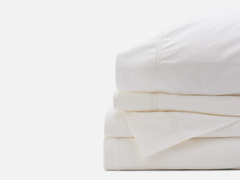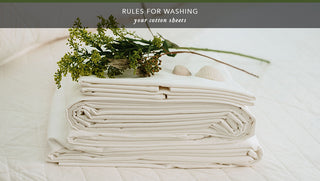It’s laundry day again, and as you lug all the hampers in your house to the laundry room, your eye may stray to your bed. When was the last time you washed your sheets? We don’t mean to forget, but with all the other things to wash in a day, it’s easy for them to put on the backburner. Even when we do wash them, we tend to toss them into the wash willy-nilly without thinking about the best way to go about the job. It’s time we laid down the law again by reviewing the rules for washing your cotton sheets.
Importance of Washing Sheets
When your kitchen floor is dirty, it’s pretty obvious to everyone in the room. You see the dirt, you feel it under your feet, and you may or may not be fighting an ant problem. Unless you just spilled something on your sheets, it might not be as obvious that they’re dirty. After all, you aren’t making dinner in bed (and if you are, we envy you). What could possibly get on your sheets to make them dirty? Turns out, there are more factors than you think when it comes to caring for your bedding.
Without getting too technical, throughout the day various oils, dirt, and sweat all accumulate on your skin. It’s why you aren’t allowed to touch anything when you walk into a museum. When you go to sleep at night, all those things end up in your sheets. And that’s just us. If you have a fur baby sleeping with you, think about all the things they get into that are now in your bed. Along with being just plain nasty, all this junk in your sheets can worsen allergies and asthma, attract dust mites, worsen eczema, and make it harder to sleep.
The Four Rights of Sheet Washing
In nursing, they have what are called the five rights of medicine. Basically, they’re five things you have to get “right” to ensure the medicine gets to the right patient. We have some rights for washing your cotton sheets, too.
Right Detergent
When washing cotton sheets, it’s always better to wash with a milder detergent and absolutely no bleach. The chemicals in harsher detergents and bleach are not kind to pure cotton sheets. Like hot temperatures, they can damage the fibers. Besides, harsh detergents aren’t necessarily more effective in keeping your sheets cleaner, and there are ways to keep your sheets bright without bleach. In fact, the harsh chemicals may react to certain stains and cause them to change colors rather than cleaning them.
When adding detergent to the load, you should also try to add just under the amount of detergent recommended for a full load. Adding too much detergent may make it harder to get the sheets completely rinsed out. That creates a coating on your sheets that catches and traps the things you’re trying to wash out of them. If you think this will be a problem for your sheets, see if your washer has the option of adding an extra rinse cycle.
Right Cycle
It’s always a good idea to consult the tag on your sheets before choosing a cycle. Generally, you will find that cotton sheets do better on gentler wash cycles. Gentler cycles will keep your sheets from becoming damaged in the wash. Avoid washing them on the heavy-duty cycle, unless there is a particularly bad stain.
Right Temperature
When we were taught how to wash our dishes, we were taught to always wash them in hot water to get all the germs off. While that may be all right for dishes, washing your cotton sheets in extremely hot water for every cycle will harm the cotton fibers and cause the sheets to fade and shrink faster, especially if you have dark-colored sheets. This isn’t to say you should never put your sheets in for a hot cycle. When cold and flu season comes around, most people recommend a hot cycle or two to help keep yourself from getting sick. But for the rest of the year, you’ll want to stick to the recommended temperature on the label, which is usually a cooler wash.
Right Dry Conditions
Hot water isn’t the only thing that will cause your sheets to shrink. Hot drying cycles can also cause your sheets to shrink. Try to dry your sheets on low heat to avoid this. Even on cooler temperatures, the tumble cycle can take it out of your sheets after a while, so resist the urge to put the sheets in for a few more minutes if they’re still damp. Instead, take a cue from the good old days and try to hang them up to dry. If you’re using one of our all-white cotton sheet sets made in the USA, you can dry them directly in the sun for a little extra sanitation.
Common Mistakes
Not Washing Them Enough
Like we’ve said, most of us don’t wash our sheets enough. But we don’t want to take it to the other extreme and over-launder our sheets, either. So, how often should we wash our sheets, especially items like baby bedding? Here in the bed-sheet world, we usually recommend once every two weeks. There are some factors that might make you want to wash them more often. If you have an animal sleeping with you, if you eat in bed, you have bad allergies, you sweat a lot, or you’re feeling sick, you might want to wash them a little more often.
Washing Them With Other Clothes
Washing your sheets with the rest of your laundry can create a lot of strain and wear on your sheets. If you think about all the rough or thicker materials that go through your other wash cycles—denim, towels, coats, and the like— it’s easy to imagine how this can happen. Over-loading the washer will also make it easier for sheets to become tangled on the agitator which also wears sheets out more. Beyond that, because other materials absorb water and dry at different rates than sheets, this can impact how well the sheets will be washed.
Using Dryer Sheets & Fabric Softener
Fabric softener and dryer sheets have a similar effect on cotton sheets that using too much detergent does. They create a coating over the sheets that traps the oils and dirt instead of allowing them to be rinsed off, making them less breathable. They can also irritate your skin and even make your sheets more likely to be flammable. Washer and dryer technology have gotten to the point that the texture of our clothes turns out just fine without dryer sheets and fabric softener.



